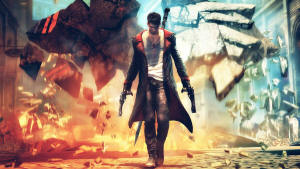| |
 DMC
- Devil May Cry (Playstation 3) DMC
- Devil May Cry (Playstation 3)
Itís been five years since the release of Devil May Cry 4, and the latest
game in the franchise, DMC, has taken a surprising new direction. In the
hands of new developers, the new game is actually a reboot that gives
players the chance to see the origins of Dante, the seriesí iconic
protagonist. A new contemporary feel driven by youth culture gives it a
different feel distinct from previous games. Grittier and less gothic, the
game is set in a more relatable world and has some fairly interesting ideas.
Itís a very interesting approach, but DMC doesnít completely alter the
formula. Once you get down to combat with foes, some familiar moves and
techniques quickly come back to the fore, which gives the game a solid
foundation. Itís an interesting mesh of old and new ideas, so look inside as
we examine how DMC successfully re-energizes this series. |
|
Players were up in arms when Capcom revealed that
the next installment in the long-running Devil May Cry franchise would be a
reboot. Using an outside developer, Ninja Theory who previously brought
players Heavenly Sword and Enslaved was another risky move. The end-result
is a game with a refreshed feel, more contemporary and trendy than previous
titles. Main character Dante is now a young teenager learning the ropes
while many of his environments reflect the current culture. There are some
clever references to earlier games, but it feels less gothic than the older
games in terms of design and presentation. As an origin story, a lot of
ground needs to be broken and there are some odd moments, but the plot is
fairly decent throughout. As the game begins, we find a young man under
attack suddenly by demon forces and slowly learn his origins and
motivations. These unfold in both the normal world and a place called Limbo
where he encounters waves of demons and monsters. We wonít ruin DmCís
revelations, but there are some cool surprises and re-interpretations that
give Danteís storyline a refreshing twist. DmCís contemporary music and
design features an abundance of contemporary industrial rock, allusions to
western themes of religion and other elements. They donít always mesh
together as smoothly as one would like, but these moments are more than
compensated for with the gameís solid mechanics and fantastic battle
sequences.
DmCís prequel storyline may be a little disorienting, once you get your
hands on Danteís weapons and attacks, it feels quite familiar. His basic
arsenal still includes his dual-wield guns which can be quite effective at
dispatching enemies while his sword slices through them easily. As in the
previous games, chaining moves together quickly creates combos that increase
in power and points as you move them around. Each successful combo you
perform is ranked and named with an explosive text window on the edge of the
screen, continuing the DmC tradition of rewarding players for their skills.
As you progress through the levels, youíll quickly find an impressive
selection of upgrades and new weapons to use during your battles. These can
be earned by unlocking them in battle or can be purchased at the numerous
statues on each level. You earn extra health and strength points by
collecting orbs and other items from fallen opponents, who will also drop
other useful items. These can be added up and used to purchase upgrades and
new moves during your missions. Attaining more powerful swords and scythes
represent the fastest and most obvious upgrades but you can also purchase
additional moves and techniques to use. These allow you more effective
attacks and additional abilities. The most important of these are the grab
and glide moves that are indicated by red and blue indicators on the level.
When these are used, Dante can jump over huge gaps and reach previously
unattainable areas or move the ground towards him. These are assigned to the
shift buttons and can be a little tricky to use at first, but become more
intuitive as you use them. They definitely add to the gameís complexity and
makes things more interesting in terms of combat and usage.
This approach also opens up the level-design and allows for some unexpected
moments. This works along with a solid combat system to create some
memorable set pieces. DmCís stylish attacks effectively create a strong
impression that brings the classic DmC style back to the forefront quickly.
As in the previous installments, the
controls are smooth and intuitive and give you a strong sense of controlling
Dante throughout. Most of the battles are fairly intense but enemies can
usually be defeated with some concentrated effort. There are some impressive
boss battles in the game as well, and these are handled with standard moves
for the most part, with little reliance on the annoying quick-time events
(QTEís) that seem to mar most other action games these days. While thereís a
current gloss on the storyline and design, when it comes time for battle,
itís definitely a refreshing throwback in the gameplay department. The
gameís structure is also fairly traditional. Its levels unfold in a fairly
linear fashion, though you can explore some sections in a constrained way.
There are a few secret areas and side-quests that you can discover, but
these donít seem to affect how the main story unfolds dramatically. DmCís
innovations are more in terms of style than substance, but thatís probably
more a function of keeping what made the previous titles so appealing,
instead of breaking new ground in the gameplay and mechanics. It plays
solidly and most fans of the series should be able to jump in with little
adjustment needed.
You
can say that the new elements add little to the new game, but the origin
story is interesting as it unfolds. DmC benefits from its clean slate, and
lets players focus on the action and main events, instead of being dragged
down by esoteric storylines. The game gradually ratchets up its intensity as
more enemies attack the player at the same time, and become more difficult
to defeat. Most of the objectives you face are fairly straightforward,
though there are some sections, particularly in the surrealist Limbo
sections where things can be a little confusing. The game flows fairly well,
too. Thereís loads of action and the cinema sequences donít slow things down
too much. From a design standpoint, DmC looks fairly good throughout with
excellent polygonal environments, interesting environments and some
impressive character designs. It seems to move a little slower than the
older games, especially early on. However, things pick up in intensity very
quickly. This approach is probably needed to re-introduce the game, and
which might make it more accessible to new players, but those who liked the
older ones will find the early hand-holding a bit much.
Some of its elements are a little odd, with the surreal flashback
sections sticking out the most, but the majority unfolds in a manner
definitely reminiscent of the earlier DmC titles. This classic feel should
make the game more appealing to fans of the original, and without giving
away too much, there is some cool fan-service in the game that makes it
worth playing through at least once.
There are some cool twists on the formula visually, such as the new foes
that look like some of the old ones, but they've been given a makeover to
make them look and feel more contemporary. There grunge music can be
distracting, but thankfully, the Ninja Theory developers havenít over-used
it. The gameís characters are interesting, though none of them compare to
Dante. Heís still got the attitude and once you get used to its superficial
differences, youíll find a game that definitely has the classic feel intact.
The gameís camera system is fairly good for this type of game, though it
does have a way of limiting you environments. Its combat sequences are good
as well with smooth camera systems that donít get in the way of the action.
Likewise, user interface is fairly good which makes navigating menus to
change weapons or implement power-ups a straightforward task. All of this
combines to make a smoothly playing and entertaining title. DmC is highly
polished and enjoyable, though not as deep as one would like in some
aspects. However, not every game needs to be a multi-hour marathon and DmC delivers a fun
entertaining experience that should satisfy most players. Itís an impressive
remake in many ways. DmC gives the old series a fresh coat of paint while
not throwing out the intense action that players loved about the previous
games. Some of the new attacks are quite cool and Danteís new abilities give
the game a different feel in places thatís more than blind combat. Players
who thought it would turn into an emo-fest should be relieved that Danteís
battles remain at the heart of the game, and that they remain entertaining
and stylish. This is one of those games that could have gone either way, but
Capcom and Ninja Theory made just enough changes to keep things fresh while
not changing the key elements that made the original games so appealing. DmC
is definitely worth playing, and comes highly recommended for long-time fans
and those new to the series.
- Michael Palisano |
| |

|